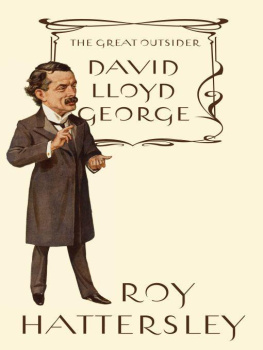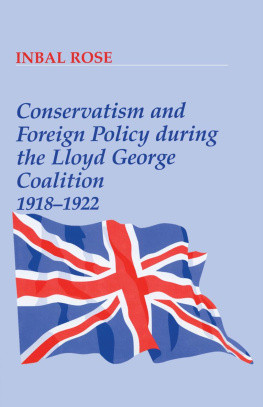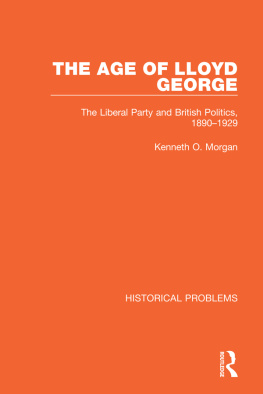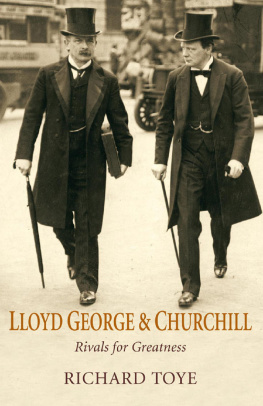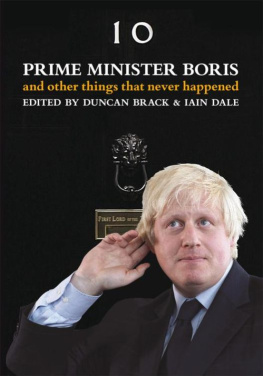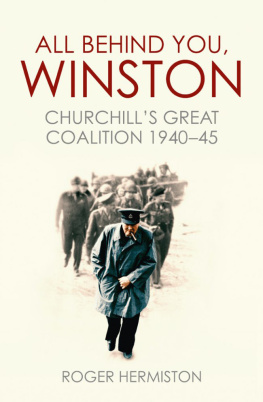Table of Contents

David Lloyd George
ROY HATTERSLEY
Hachette Digital
www.littlebrown.co.uk
Published by Hachette Digital 2010
Copyright Roy Hattersley 2010
All rights reserved.
No part of this publication may be reproduced, stored in a retrieval system, or transmitted, in any form or by any means, without the prior permission in writing of the publisher, nor be otherwise circulated in any form of binding or cover other than that in which it is published and without a similar condition including this condition being imposed on the subsequent purchaser.
A CIP catalogue record for this book
is available from the British Library.
eISBN : 978 0 7481 1785 7
This ebook produced by JOUVE, FRANCE
Hachette Digital
An imprint of
Little, Brown Book Group
100 Victoria Embankment
London EC4Y 0DY
An Hachette LivreUK Company
www.hachette.co.uk
www.littlebrown.co.uk
To Maggie
ACKNOWLEDGEMENTS
It was Roy Jenkins who, many years ago, suggested that I write a biography of David Lloyd George-a politician he disliked so heartily that he could not contemplate writing the book himself. My first thanks are therefore due to Lord Jenkins for stimulating the unreasonable ambition to compress the story of such a long and eventful life into one volume. It could not have been achieved without the help for which I express my sincere gratitude.
J. Graham Jones, the director of the Welsh Political Archives, and his staff in the National Library of Wales made it possible for me to examine the Lloyd George papers in their collection. Mari Takayangi and her colleagues provided equally invaluable help during the days I spent in the House of Lords working on the collection of documents which passed from Countess Lloyd George, through Lord Beaverbrook to the parliamentary archives. Mr James Illingworth generously allowed me to see the previously unexamined political papers left by his grandfather, Percy Illingworth MP, Chief Whip to Herbert Asquith. Jennifer Longford (ne Stevenson) was equally generous in making available the Lloyd George and Frances Stevenson papers which remain in her possession. Neville Masterman lent me copies of articles and essays written by his mother and father when they were close to Lloyd George during the years of his political greatness. Professor Prys Morgan - as well as filling in gaps in my knowledge of nineteenth-century Wales - allowed me to read and quote from his English translation of D. R. Daniels unpublished Lloyd George memoir. The London Library consistently and swiftly found copies of the many obscure books written by Lloyd Georges early associates. The library of the House of Lords produced ancient copies of Hansard with remarkable alacrity.
Cynthia Shepherd, my PA, typed the first draft, compiled the two appendices and provided invaluable assistance in the compilation of the notes and references. My thanks are also due to Richard Beswick - my editor at Little, Brown, my publisher - and to his colleague Iain Hunt who, assisted by an anonymous copy editor, patiently eliminated the literals which I am pathologically unable to avoid.
My greatest gratitude is due to Professors Kenneth O. Morgan and Anthony King. Lord Morgan read the third draft of my manuscript. Thanks to his correction of errors and rectification of omissions, the fourth and subsequent drafts were much improved. Not once did he show the slightest resentment that I had invaded a field which he has dominated for forty years. Tony King - a friend for almost half a century - read the penultimate draft, ruthlessly identified confusions, contradictions and inconsistencies, and made detailed proposals about how each one could be eliminated. Of course, the shortcomings which undoubtedly remain are my responsibility alone.
CHAPTER 1
THE LAND OF MY FATHERS
D avid Lloyd George - certainly the most famous and perhaps the greatest Welshman of all time - was born in Manchester. But, as he told his son, nationality has nothing to do with geography... It is a state of mind. Lloyd Georges state of mind was Welsh. Blood and upbringing shaped his character, not the accident of birth which made him officially English. Charm, energy and ruthless determination would have guaranteed success wherever he had spent his youth and early manhood. And he would have been guaranteed an enamoured following by his vitality - the Promethean fire, because of which so much was expected and so much forgiven. But it was Llanystumdwy and Criccieth that created his defining attributes. The rebellious schoolboy and the insubordinate young solicitor became the Great Outsider-a man who felt no obligation to respect the rules of the society in which he lived. His upbringing - both the teaching of his Church and the adoration of his uncle - made him an outsider who felt superior to the establishment which he despised. That confidence combined with ambition, conviction and contempt for convention to make him the authentic radical of British political history.
The Chancellor of the Exchequer who created the welfare state and became the Prime Minister who was credited with winning the First World War was born plain David George. The Georges of Pembrokeshire farmed at Trecoed, near Fishguard - according to family folklore their ancestors reward for fighting with Henry Tudor on Bosworth Field. They remained farmers for three hundred years, but William George - Davids father - devoted his energies to improving his mind rather than cultivating the soil.
In 1841, William George, just twenty-one, registered as a student at the Battersea Teachers Training Institute. He was already showing symptoms of the disease which killed him. I am getting to feel rather apprehensive about myself. I brought up 2 or 3 specs of blood before I went to London. After an extended holiday - during which he replaced his books and his lost greatcoat - he was appointed head of the Hope Street Unitarian School in Liverpool. It was a broad-minded foundation. William George - a pious and practising Baptist - was acceptable both as head and as teacher in the associated adult Sunday School.
In Liverpool, William George at last made friends who he thought were suitable to his status and intellectual standing. They included Thomas Goffey, a solicitor who was to have an important influence on the careers of both his sons. But Liverpool soon lost its charm. He left the city, a week before Christmas 1852, taking with him a full set of the Penny Encyclopaedias and a copy of Websters Dictionary , inscribed: Presented to Mr William George by the teachers and conductors of Hope Street Church Sunday School as a token of their esteem.
In April 1854, William George opened his own proprietary - that is to say private - school in Haverfordwest in Pembrokeshire. Family legend attributed the initiative to his marriage to Selina Huntley, a rich but sick widow who either owned the school building or financed its purchase. The venture did not succeed. The English in the town wanted schools which were owned and governed by the Established Church. The Welsh resented the promise that great attention will be paid to the study of the English language, a knowledge of which is indispensable to the successful pursuit of every business and profession in this country. Selina George, on whom the school depended, died sometime during 1856. At the end of that year, the widower considered becoming second master at Blaenau Ffestiniog in Gwynedd, in one of the British Schools which were being established in Wales. He decided against and in August 1858 accepted a similar appointment at Troed-yr-Allt in nearby Pwllheli.
Troed-yr-Allt was close by The Castle, the home of a Miss Evans, who employed, as her companion, Elizabeth Lloyd of Llanystumdwy. Betsys father, who had died in 1839 when she was eleven, had been one of the two shoemakers in Penymaes, a village near Criccieth. He had also been the pastor of Capel Ucha. The Lloyds were Children of God - a Baptist sect whose members aspired to follow the simple teaching of the early Christian Church. Children of God believed that it was better to attend an orthodox Baptist service than to miss Sunday worship altogether. So Betsy Lloyd joined the congregation at Capel Berea in Criccieth. There she met William George. They were married on 16 November 1859.
Next page
